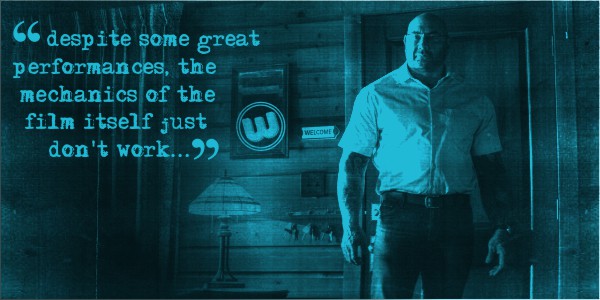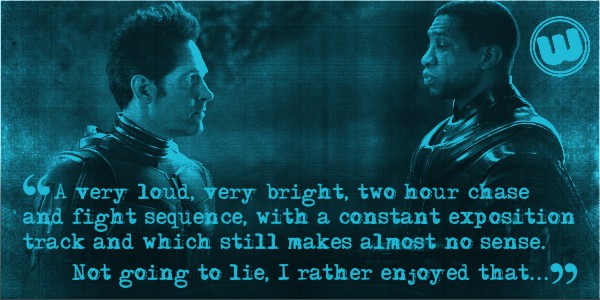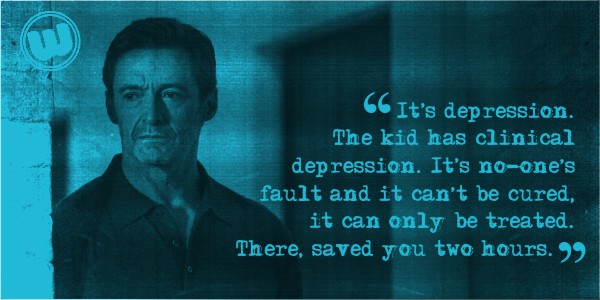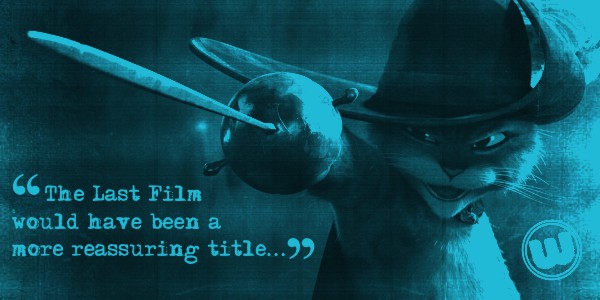
Knock At The Cabin (Spoilers)
Cert: 15 / 100 mins / Dir. M. Night Shyamalan / Trailer
It's the quintessential case of Cause And Effect™; a 300lb wrestler swings a home-made battleaxe in Pennsylvania, and a series of tsunamis destroy the Caribbean. And if you're fine being told these events are linked without actually being shown any evidence, you are going to love Knock At The Cabin.
Adapted from Paul Tremblay's 2018 novel by Steve Desmond, Michael Sherman and M. Knight Shyamalan, the story centres on Eric (Jonathan Groff) and Andrew (Ben Aldridge), on vacation in the eponymous remote cabin with their young daughter Wen (Kristen Cui). Their rural tranquility is shattered when four religious missionaries (Dave Bautista, Rupert Grint, Nikki Amuka-Bird, Abby Quinn) arrive, warning of the end of the world and the choices which need to be made to avoid it...
DUTY
Credit where it's due, the cast are fully committed here and Shyamalan's directorial work is superb at ramping up tension. The first act in particular fizzles, not because the quartet of interlopers are shouting, violent maniacs, but because of how reasoned, reluctant and ultimately resigned they are to their duty. This is thanks in no small part to Bautista's lead antagonist, Leonard, and the actor is the note-perfect mix of intellect and braun*1 to carry the sense of conflict over to an audience trying to make sense of it all. Rupert Grint, Nikki Amuka-Bird and Abby Quinn are great as Leonard's cohorts Redmond, Sabrina and Adriane, but ultimately lose out in the battle for screen-time.
Over on the sensible side of the fence, Jonathan Groff and Ben Aldridge are very solid in balancing parental protectiveness, survival instincts and blind panic as their (personal) world is threatened seemingly out of nowhere and for no poetically-viable reason*2. And as above, Kristen Cui brings an assured performance as their daughter (the one who should be losing it completely, but somehow isn't), even if that's overshadowed by everything else that's going on in the film.
WILD
The problem is that the mechanics of film itself just don't work. The first act contains perfectly workable scripted allusions to the backstory of Eric, Andrew and their adopted daughter, then the rest of the film repeatedly cuts to needless flashback scenes showing the audience what they've already been told. This feels like a deliberate attempt to temporarily move the action out of the cabin, and destroys the necessary sense of claustrophobia as a result.
Outside of the central premise of the story (more on that very shortly), the screenplay presents a mashup of contemporary issues, from societal homophobia and victim-culture to social echo chambers, confirmation-bias and online radicalisation. Precisely none of these are explored properly (and really can't be due to the urgency of the main narrative), so they add no texture to what is a very straightforward plot. Although at least this follows traditional horror movie conventions by having protagonists under duress make exceedingly stupid decisions, like hoping a locked bathroom door will contain brick-shithouse Leonard, having just watched him commit three murders with a five-foot axe...
MUNCH
Okay, gloves-off, heavy spoilers from this point in. I won't bury them in the footnotes with highlight-to-read tags, since these are the intrinsic problems with Knock At The Cabin. The strongest setup, frowniest chin-stroking and best performances count for little when a screenplay spells out the why in small words, but blithely skips over the gaping holes in the how.
The central premise is this: Leonard explains that the four of them have had visions of the end of the world, and that they've been told in these how to avert it. The visions have drawn them all to this cabin (not knowing exactly who they'd find there), and told them that the three family members have to decide amongst themselves which one of them is to be sacrificed by the other two. This will stop the world from ending. The prophets can't kill the family member, and one of them can't choose suicide. It has to be a willing sacrifice. When asked by the strangers who they nominate, failure of the family to make a choice means that one of the strangers will be killed by the others (in front of the family), and a catastrophic event will be unleashed upon the earth as a punishment. The family will then have time to reflect upon this until being asked again, and the cycle repeats until they either choose one of themselves to die, or all the prophets are killed and the world finally ends in screaming flames and disease.
The central problem is this: We see all of this happen - more than once, as the film escalates its drama - with Eric and Andrew unable to make a choice (obviously, since in the first instance this is all at the word of four nutjobs who have just shown up at the front door). Redmond (Rupert Grint) is first to forfeit his life as part of the prophecy, desperately furious but ultimately accepting his part of the larger picture as he kneels at the family's feet while Leonard swings his home-made axe (a broom handle tied to an array of meat cleavers, by the looks of it) into Redmond's ceremonial white hood*3 and ending his life in no uncertain terms. The remaining members of gang switch on the TV*4 where news channels are swamped with reports and mobile-footage of tsunamis and tidal waves wreaking global havoc. Except the family made their non-choice less than 90 seconds earlier, and all of these social media videos have already made their way onto broadcast television*5. Meaning these events have already happened and have nothing to do with what's going on in the cabin. Eric and Andrew even point this out in the scripted dialogue and it's still roundly ignored. And even if the news was somehow a superbly organised real-time commentary, Leonard and his mates could avoid the end of the world by simply not killing Redmond. After all, Len states that it's their subsequent actions which unleash the disasters, no matter how piously they try to shift blame onto the family. Big shades of 'look what you made me do', here...
MASH
In another weird failure to commit to responsibility, every time one of the film's close-quarters murder-shots occurs, the moment of deadly impact happens just out of frame. This is often with the camera purposely drifting away from the action, leaving it up to the sound designer and audience's imagination to complete the gory puzzle. It would be easy to say that unflinchingly showing such violence on-screen would be exploitative (not to mention expensive for the effects teams), and that the actions of the antagonists should be implied rather than demonstrated. But ultimately, this is an exploitation flick; it's certainly not a post-modern examination of Western morality in a godless 21st century. Shyamalan gleefully sets up the most brutal sacrificial deaths with one hand, and then chickens out of showing them with the other, acting as if no-one in the audience has seen Midsommar. It's almost as if he wants to make a provocative film without upsetting anybody.
Speaking of which, the script here talks heavily of prophecy and sacrifice, but barely mentions God at all. And the disasters which beset humanity - earthquakes, tidal waves, pestilence - are distinctly biblical, and yet the actual Bible doesn't get a look in. It's possible that this pseudo-religious imagery transcends organised religion of course, and is instead a more primal force hitherto unrecognised by millennia of clergymen, but tapping into the same superstitious fear of natural disasters. I mean it's possible but it's not likely because the film never addresses this. Shyamalan just uses a narrative divine hammer to punish, while being too fearful to name the one who's holding it. It's almost as if he wants to make a provocative film without upsetting anybody.
That said, the entire subtext of Knock At The Cabin is that a same-sex couple adopting a child has angered an unnamed deity to the point where the world is going to be destroyed if the pair don't renounce their ways by irretrievably breaking up the family unit. So at least no-one was worried about upsetting the gays, then?
It would arguably be interesting if it wasn't all so pathetic.*6
W*A*L*T*E*R
One would imagine that with a cast of seven people, even M. Knight Shyamalan wouldn't be able to crowbar-in one of his legendarily awful cameo appearances. WRONG. Ironically, it was at this point that even an old atheist like me developed enough faith to start praying for the end of the world to come early. I've had a more convincing sense of the apocalypse listening to Keeper Of The Seven Keys, and at least Helloween managed to keep it all to under a quarter of an hour...
As should be apparent by now, I have not read the source-novel for Knock At The Cabin, so I don't know how much of the above is a problem with author Paul G. Tremblay or co-screenwriter M. Knight Shyamalan. But since ultimate responsibility for the content of a film falls upon the shoulders of its director, let's go with the latter.

*1 I have a lot of time for Dave Bautista. He's got good range, great timing and with the right script he's a joy to watch. Thankfully he seems to have coasted through the Schwarzenegger-route of faintly sub-standard action comedies and got to a place where he can actually concentrate on the acting. But - so far - he's always playing Dave Bautista™, and that charm is definitely limited. When it runs out, the industry and audience alike will turn on him, and I have to admit that I will probably have run out of patience even before that point... [ BACK ]
*2 As great as they are, this is atrocious casting since Jonathan and Ben look just like the same actor on different days. And when the four antagonists have such intrinsically distinct appearances, it means the two leads essentially become one character whenever both of them aren't on-screen, which I'm pretty certain runs against the whole idea of having a same-sex couple at the centre of the story. Well done everyone. [ BACK ]
*3 This isn't a 'KKK' style white hood by the way, but a close-fitting, featureless whole-head mask. If anything, I suspect the production-design of this has something to say about face-masks in the COVID pandemic, but any pointed meaning gets lost in the directionless noise of the rest of the film. Although ironically enough, the character of Redmond probably is a racist. He's certainly shown to be a red-neck homophobe, after all... [ BACK ]
*4 Because the cabin is so rural and remote that there's no mobile signal meaning that they can't call for help once the land-line has been cut , but there is a hi-def TV signal and/or broadband connection? Okay M Knight, got it. [ BACK ]
*5 And while Knock At The Cabin is far from the only cinematic culprit in this regard, TV stations don't just broadcast anonymous unedited phone footage of ongoing disasters where people are dying on-camera. Even in America. And it's not out of good taste or respect for privacy, but because they'd get sued to absolute fuck by the families of the deceased. [ BACK ]
*4 And they do it in the end, obviously. The sacrifice. The world needs to be saved, and this film just isn't misanthropic enough to admit that humanity's had its turn. Andrew, who took the knock on the head in Act I and has been concussed for the entire film, convinces Ben in a state of blunt-force trauma and extreme situational stress to kill him, so Ben does it. We don't get to see that kill either. More worryingly though, the end of the film features an extended and badly assembled faux-BBC News report once all the apocalypses have stopped, involving a nurse standing outside an Intensive Care Unit saying that nobody in there has died for over two hours and how unusual that is. Is this the happy ending, M. Knight? Judgement day has been averted and now there's no more death any more and everyone's going to live forever? The planet can barely support 7.9 billion people as it is; I really don't think that the accelerated destruction of the Earth's resources which comes from the inevitable overcrowding of an exponentially-increasing global population is a cause for celebration. I imagine that'll get blamed on the gays as well, will it? Fuck's sake, M. Knight... [ BACK ]
DISCLAIMERS:
• ^^^ That's dry, British humour, and most likely sarcasm or facetiousness.
• Yen's blog contains harsh language and even harsher notions of propriety. Reader discretion is advised.
• This is a personal blog. The views and opinions expressed here represent my own thoughts (at the time of writing) and not those of the people, institutions or organisations that I may or may not be related with unless stated explicitly.









